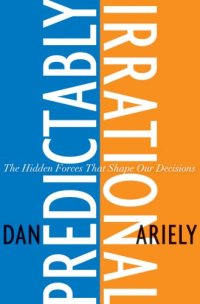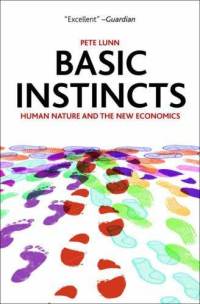Book Review: Predictably Irrational
 Dan Ariely’s story is a fascinating one. As an 18 year-old growing up in Israel, he was caught up in an explosion that left 70 percent of his body covered with third degree burns. His three year recuperation period in hospital involved daily disinfectant baths and bandage changes that even sound excruciatingly painful. But the experience led him to reflect on how the world works, why we do what we do and ultimately to a career in the study of behavioural economics.
Dan Ariely’s story is a fascinating one. As an 18 year-old growing up in Israel, he was caught up in an explosion that left 70 percent of his body covered with third degree burns. His three year recuperation period in hospital involved daily disinfectant baths and bandage changes that even sound excruciatingly painful. But the experience led him to reflect on how the world works, why we do what we do and ultimately to a career in the study of behavioural economics.
Predictably Irrational is a highly readable and fascinating account of research conducted by Ariely and those of like mind. It examines a variety of important questions about human behaviour. Why are we susceptible to the word – free? Do men (particularly) think differently when aroused? No prizes for guessing the answer to that one. Why do we all suffer from problems of procrastination which characterises everything from missing project deadlines to failing to look after our health and save for retirement? Why do we overvalue what we have? Think of how the prices of houses diverge between sellers and buyers. Why are we prone to keeping our options open? Why are we less likely to steal cash than products of the same value? Experimental research findings are presented to demonstrate the existence of these and a variety of other irrational behaviours.
So this book challenges the basic economic notion that we are rational – that is, the simple idea that in everyday life we compute the value of all the options open to us and follow the best course of action. Ariely argues that not only are we irrational but rather that we do it again and again – we are predictably irrational. And it has profound implications for many aspects of marketing and decision making. For example, relativity plays a huge part in how we evaluate options. Given a choice of three prices, most people will tend to go for the middle one. High priced items on a restaurant menu boost revenues even if no one actually buys them because customers tend to go for the second highest one. Not rational but consistent! When we consider buying new products, the first price we see becomes an anchor which is why many luxury items can command prices that are off the scale. Add to that, the finding that the higher the price of the drug, the better we perceive it will make us feel and we begin to appreciate the power of one of the key weapons in the marketing arsenal.
First published in 2008 and revised and updated in 2009 in the wake of the global financial crisis, the book is a must read. It tells us a great deal about ourselves and why we are far less in control than we like to think.






 John Fahy
John Fahy